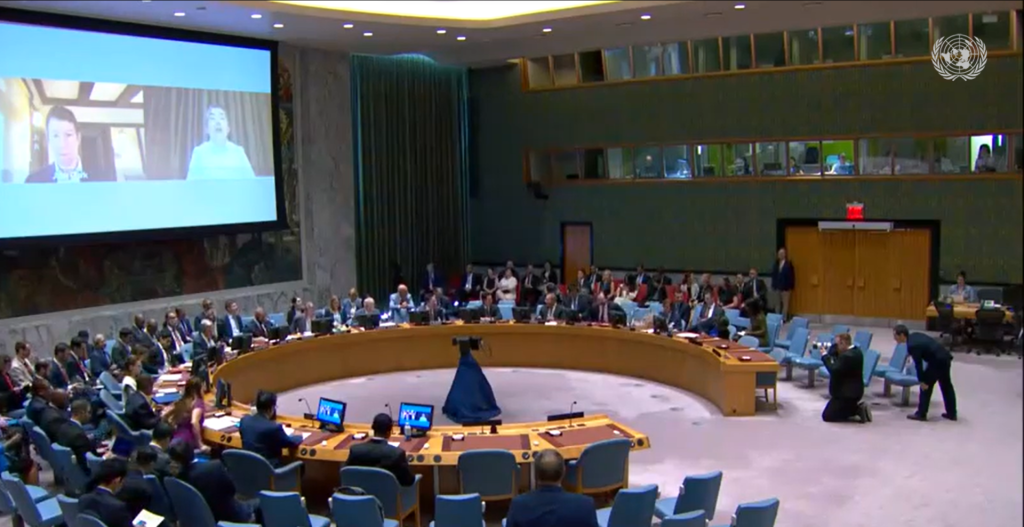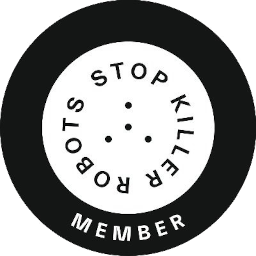
Screenshot: Artificial Intelligence: Opportunities and Risks for International Peace and Security – Security Council, 9381st Meeting.
In July, under the UK’s presidency of the United Nations Security Council (UNSC), two promising and exciting developments on the path to regulate and prohibit autonomous weapons took place. On 18 July, the UNSC met for the first time to discuss the opportunities and risks presented by AI. Two days later, the UN Secretary-General, Antonio Guterres, published his policy brief ‘A New Agenda for Peace.’ The brief included a clear and strong recommendation to Member States to start negotiations on a treaty on autonomous weapons by 2026.
These events signal a widespread recognition amongst the international community that the rapid pace at which AI is developing and the problems with autonomous weapons requires urgent action. This follows a historic call issued by Latin American and Caribbean countries in February of this year for “the urgent negotiation of an internationally legally binding instrument on autonomy in weapons systems” and the adoption of the Belen Communique in Costa Rica. The number of states supporting a legally binding instrument now stands at 90. Another significant development has been convergences in states positions on what constitutes meaningful human control.
First-ever UN Security Council session to discuss AI
The UK’s decision to make AI one of the main focuses of its presidency follows the Prime Minister’s announcement in June that the UK will be hosting the first global summit on AI Safety this autumn. The meeting at the UN in New York was chaired by the UK Foreign Secretary James Cleverly. Member States were briefed by the UN Secretary-General, Jack Clark, Co-founder of the AI company Anthropic, and Professor Zeng Yi, Co-director of the China-UK Research Centre for AI Ethics and Governance.
Speaking to the council, the UN Secretary-General said ‘I agree with the large number of experts that have recommended the prohibition of lethal autonomous weapons without human control.’ He went on to warn Member States that ‘Both military and non-military applications of AI could have very serious consequences for global peace and security.’ It’s not the first time that the UN Secretary-General has expressed his support for a prohibition on autonomous weapons. In 2019 at the Paris Peace Forum, he described them as “politically unacceptable and morally despicable” and since taking office in January 2017 has spoken out against autonomous weapons on multiple occasions.
Member States also had the opportunity to contribute to the discussion with many including China agreeing on the need to ban autonomous weapons stating that all countries “should avoid the unintentional misuse or even intentional misuse of AI weapons systems.” This agreement emphasises the need for Member States to work together to establish clear international legal rules and achieve policy convergence on a combination of prohibitions and regulations.
A New Agenda for Peace policy brief
On Thursday 20 July, the UN Secretary-General published his policy brief ‘A New Agenda for Peace’ outlining his vision and presenting recommendations. The brief forms part of the preparation for the Summit of the Future which is due to take place next year.
At the launch of his policy brief ‘A New Agenda for Peace’, the Secretary-General called for negotiations to prohibit lethal autonomous weapons to be concluded by 2026. The imposition of a deadline signals the importance and urgency of the task at hand. It also sends a message to Member States, in light of the disappointing progress made at the final meeting of this year’s UN Convention on Certain Conventional Weapons (CCW) Group of Government Experts (GGE) meeting on autonomous weapon systems, that substantive progress must be made towards a new international law on autonomy in weapons systems.
An opportunity for real progress
Autonomous weapon systems raise a host of legal, ethical and moral questions and civil society has been at the forefront of the debate on the issue calling for people and human rights to be prioritised.
This autumn, Member States have the opportunity to push towards negotiations through the UN General Assembly (UNGA)-a forum that is inclusive of all states and does not depend on consensus from all states, which has been used as an effective veto on progress in the CCW. A draft resolution, which builds on a joint statement-signed by the UK-to the UNGA last year, and which could represent a step towards negotiations of a legal instrument, is expected to be proposed.
Building on the progress made so far, the UK Campaign to Stop Killer Robots calls on the UK government to demonstrate its commitment to implementing the Secretary-General’s recommendation to regulate and prohibit autonomous weapons by 2026, by supporting any resolution in the UNGA that will push forward progress on addressing the problems with autonomous weapons systems.
